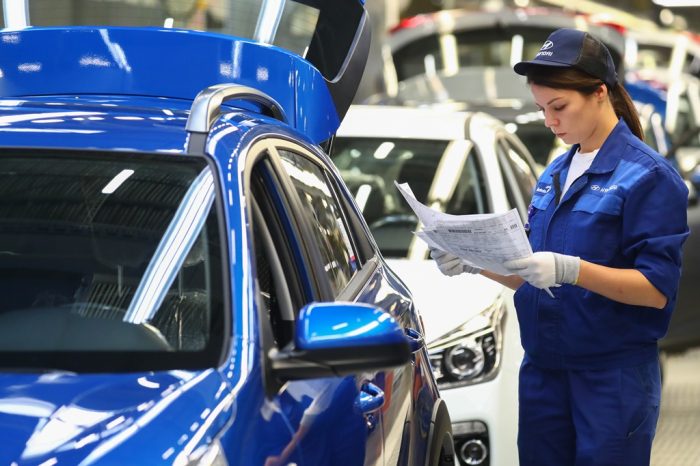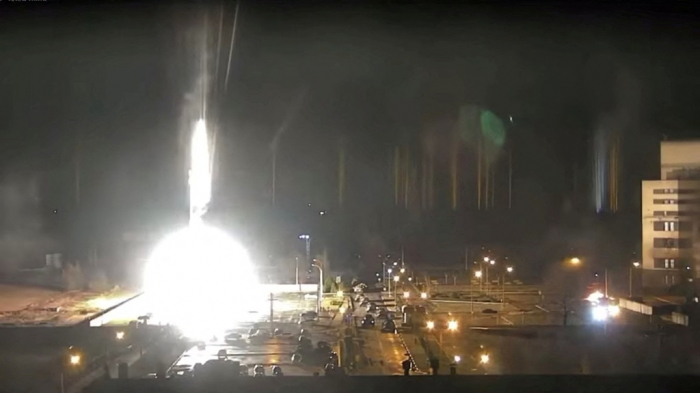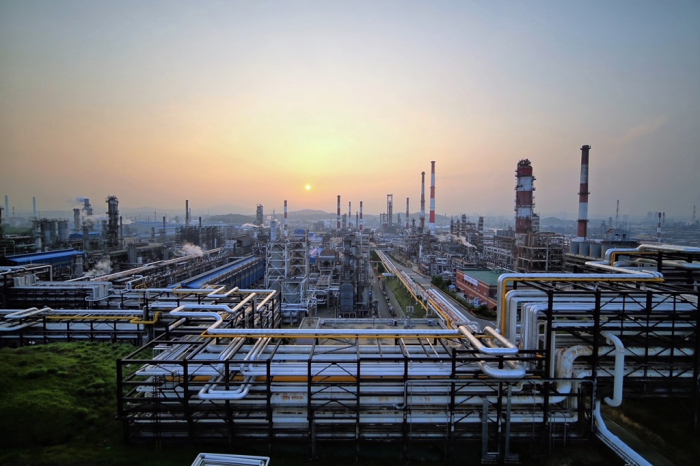War in Ukraine
Korea Inc. in dilemma over Russia biz amid Ukraine war
South Korean companiesŌĆÖ Q1 profit forecast falls 6% as Russia-Ukraine war is expected to hit most industries
By Mar 08, 2022 (Gmt+09:00)
long read
Most Read

South KoreaŌĆÖs major companies are in a sticky situation over their businesses in Russia following its invasion of Ukraine.
Governments in the West have imposed economic sanctions against Russia, while it has taken retaliatory actions, hurting South Korean companiesŌĆÖ business there. They have been urged to withdraw from Russia but it is hard to give up the long-term growth opportunities in the worldŌĆÖs largest country by area, spanning Eastern Europe and Northern Asia.
ŌĆ£We are stuck between a rock and a hard place. If we withdraw from Russia, we may not ever get back. But if we continue the business, we will be labeled as a company that is trying to make money in a country that started a war,ŌĆØ said a source at a major South Korean company that operates a plant there.
ŌĆ£We cannot immediately stop our business like US Apple and GM, but it is extremely hard to maintain our business. So, we just lie low.ŌĆØ
South Korea has joined the multinational sanctions against Russia, including export controls and the removal of Moscow from the SWIFT global payment system. Russia has issued a list of countries such as South Korea, which are "taking unfriendly actions against Russia, Russian companies, and citizens.ŌĆØ
BETWEEN A ROCK AND A HARD PLACE
Samsung Electronics Co. was urged to stop selling products and providing services in Russia by Ukraine.
The countryŌĆÖs Vice Prime Minister Mykhailo Fedorov last week sent a message to SamsungŌĆÖs Vice Chairman and Co-CEO Han Jong-hee to request the South Korean tech giant to suspend supplying services and products to Russia including blocking access to the Samsung Pay and Galaxy stores.
ŌĆ£As long as Russian tanks and missiles bomb kindergartens and hospitals in Ukraine, your cool equipment cannot be used by Russians!ŌĆØ Fedorov said on his Twitter.
Samsung is in a difficult position from which to take further action since it has already stopped product shipments to Russia.
SamsungŌĆÖs sales in Russia were about 4.4 trillion won ($3.6 billion), relatively smaller than other markets. But its factory in Kaluga, southwest of Moscow, produces home appliances for the Commonwealth of Independent States (CIS). A withdrawal will hit the market that Samsung has long been cultivating.
Hyundai Motor Co. South KoreaŌĆÖs top automaker, faced growing pressure as its global competitors such as Toyota Motor Corp. took measures such as suspension of car production in Russia. Hyundai has been expanding its market presence with more investment even after Russia invaded and subsequently annexed the Crimean Peninsula from Ukraine in 2014, which also led to economic sanctions from the West.
The South Korean carmaker is the No. 2 in Russia, operating a factory with an annual capacity of 230,000 units in St. Petersburg.
Hyundai reportedly said that it will cope with the situation with patience, comprehensively considering future growth potential although Russia accounts for less than 4% of its global market in a recent meeting with analysts.
But industry sources said the latest global sanctions against Russia are different from the restrictions imposed in 2014.
ŌĆ£Hyundai could become the target of a global boycott if it keeps staying in Russia, given the growing importance of environmental, social and governance (ESG) management,ŌĆØ a source said.
FEW OPTIONS
The Russian government was reportedly closely watching closely South Korean companiesŌĆÖ operations in the country.
ŌĆ£The government is monitoring every day whether South Korean companies should withdraw through authorities such as the Russian Embassy in Korea,ŌĆØ said an executive at a conglomerate, who had served as chief of the groupŌĆÖs Moscow operation. ŌĆ£Companies have no choice but to pay attention to the Russian government.ŌĆØ
South Korean companies have earned trust from the Russian government as they maintained businesses even during the Russian financial crisis in 1998 when other foreign companies fled from the nation. South Korean food makers such as Orion and Paldo topped the market based on such trust, a Korea Trade-Investment Promotion Agency official said.
ŌĆ£At the moment, we are caught in a dilemma. It is frustrating that we have few options, only hoping for the end of the war,ŌĆØ said an industry source.
HOPELESS SITUATION
But the war is unlikely to end anytime soon.
ŌĆ£UkraineŌĆÖs ports are closed and all rail freight transportation is suspended. There are no trucks on the roads,ŌĆØ said the head of a South Korean trading companiesŌĆÖ Ukraine unit in a telephone interview with The Korea Economic Daily.
Russia was expanding its military attacks into civilian facilities such as power plants, he said. He is currently working in Istanbul to handle his business after leaving Ukraine by plane in the middle of last month.
ŌĆ£The Russian defense ministryŌĆÖs official announcement that it is not attacking civilian facilities is not true,ŌĆØ he said, asking not to be identified for the safety of the remaining staff in Ukraine.

The Russian forces are also targeting southern port cities of Ukraine to hurt the countryŌĆÖs economy, he said.
ŌĆ£The occupation of Kyiv is symbolic in politics, while the occupation of Black Seal coastal cities will economically isolate Ukraine,ŌĆØ he said. ŌĆ£There was talk that Russia intentionally delayed the occupation of Kyiv to take controls of more cities in the southern region despite continuous battles outside Kyiv.ŌĆØ
Two major hub ports in Ukraine -- Odessa and Mykolaiv -- were blocked, while┬ĀPOSCO International┬ĀCo., a South Korean trading company, stopped operations of its grain terminal in Mykolaiv on the Black Sea.
Q1 PROFITS TO TUMBLE
The intensifying crisis is expected to slash South Korean companiesŌĆÖ profits this quarter.
South KoreaŌĆÖs 131 listed firms are forecast to report a combined 36.4 trillion won in operating profit during the January-March period, according to financial information provider FnGuide Inc. on Tuesday. This is 2.3 trillion won or 6% lower than a consensus of 38.7 trillion won predicted before RussiaŌĆÖs military attack on Ukraine.
Profit forecasts for shipbuilders and petrochemical producers tumbled due to their reliance on exports. Surging prices of oil and raw materials such as aluminum and palladium are also predicted to raise the production costs of other industries.
ŌĆ£The longer the war lasts, the more industries will get hurt,ŌĆØ said an investment bank source in South Korea, adding domestic sectors such as retails and logistics will not be immune to the impact from the military conflicts.
SHIPBUILDERS
A major shipbuilder recently stopped revision of this yearŌĆÖs business plan that had been set up in late November last year, given the extreme uncertainties over the Ukraine crisis.
ŌĆ£The cost analysis became meaningless due to the severe volatilities in prices of various raw materials and the foreign exchange rates,ŌĆØ said a source at the company. ŌĆ£We have no choice but to wait for the end of the war.ŌĆØ
Korea Shipbuilding & Offshore Engineering┬ĀCo. (KSOE), under Hyundai Heavy Industries Group, is expected to log an operating loss of 2 billion won, according to FnGuide. That compared to the previous forecast of a profit of 38.7 billion won.
The industry had been expected to win more orders on the crisis in Ukraine as Europe is diversifying natural gas suppliers to cut reliance on Russia for the energy resource.
But the sector now saw more risks from cancellations of existing deals with Russia or rejections of receipts by the countryŌĆÖs customers, given financial sanctions such as Russia's removal from the SWIFT global payment system.
Russia also allowed companies and citizens to temporarily pay foreign currency debts owed to overseas creditors from "unfriendly countries" using the rouble. South KoreaŌĆÖs shipbuilders are expected to suffer massive foreign exchange losses as the Russian currency has lost about 40% against the dollar so far this year, according to Reuters.
PETROCHEMICAL, REFINING SECTORS
The petrochemical sector is another victim as prices of naphtha, the feedstock of petrochemicals such as ethylene, surged to a 14-year high, tracking soaring crude prices.
Lotte Chemical Corp. is forecast to post an operating profit of 145.1 billion won in the first quarter, according to FnGuideŌĆÖs latest data, less than a half of the previous expectation of 313.7 billion won. Profit forecasts of Hanwha Solutions, LG Chem Ltd. and Hyosung Chemical also declined.
Russia was South KoreaŌĆÖs largest naphtha supplier, providing about a quarter of the Asian countryŌĆÖs total requirements. The domestic petrochemical sector is feared to suffer from surging production costs and disruptions in naphtha supply, industry sources said.
The refining industry is not free from the fallout from the war even as the soaring crude prices are expected to ramp up inventory gains.
The sector, however, grew concerned over a possible global economic slowdown due to the jump in oil prices. The benchmark Singapore gross refining margin against Dubai┬Āfell for a fifth straight week to $5.7 a barrel in the first week of this month.
ŌĆ£Petroleum product demand in Europe showed signs of weakening due to the war,ŌĆØ said a refining industry source in South Korea. ŌĆ£If crude prices rise further on supply disruptions, that could hurt refinersŌĆÖ earnings.ŌĆØ
SK Innovation Co. and its local peers are considering gradually cutting runs.

Few industries in South Korea are not exposed to the risks from the war if it continues longer, given concerns over a vicious cycle whereby rising commodity prices increase inflationary pressures, hurting purchasing power and demand, analysts said.
ŌĆ£Most companies had played down the Ukraine issues,ŌĆØ said a local business circle source. ŌĆ£But now we may face a nightmare of the stagflation of rising inflation with an economic recession, similar to the one seen during the oil crisis of the 1970s.ŌĆØ
Write to Il-Gue Kim, Kyung-Min Kang, Sin-Young Park, Jeong Min Nam and Yun-Sang Ko at black0419@hankyung.com
Jongwoo Cheon edited this article.
More to Read
-
 War in UkraineRussia-Ukraine war disrupts Korean exports to Europe
War in UkraineRussia-Ukraine war disrupts Korean exports to EuropeMar 07, 2022 (Gmt+09:00)
5 Min read -
 War in UkrainePerfect storm from Ukraine crisis clouds Korea Inc.ŌĆÖs outlook
War in UkrainePerfect storm from Ukraine crisis clouds Korea Inc.ŌĆÖs outlookFeb 25, 2022 (Gmt+09:00)
4 Min read -
 War in UkraineKorean shipbuilders set for more orders on Ukraine crisis
War in UkraineKorean shipbuilders set for more orders on Ukraine crisisFeb 23, 2022 (Gmt+09:00)
3 Min read -

-
 Business & PoliticsWar in Ukraine: Risk and opportunity for Korean shipbuilders
Business & PoliticsWar in Ukraine: Risk and opportunity for Korean shipbuildersMar 04, 2022 (Gmt+09:00)
3 Min read -
 AutomobilesHyundai, Kia heavily exposed to Ukraine crisis; shares at 52-week lows
AutomobilesHyundai, Kia heavily exposed to Ukraine crisis; shares at 52-week lowsFeb 28, 2022 (Gmt+09:00)
3 Min read
Comment 0
LOG IN




